Reflective Learning, Gibbs Model, and Feedback in Education
VerifiedAdded on 2023/06/10
|8
|2290
|99
Essay
AI Summary
This essay explores the concept of reflective learning, emphasizing the use of the Gibbs reflective model to analyze experiences and improve learning outcomes in higher education. It describes the importance of reflection, including the description, feelings, evaluation, analysis, conclusion, and action plan stages of the Gibbs model. The essay also explains the nature of feedback and feedforward, highlighting their role in informing and improving student performance, particularly in formative and summative assessments. It emphasizes how a reflective approach to feedback and feedforward can enhance future assessments by identifying areas for improvement and fostering a deeper understanding of learning processes. The essay concludes by underscoring the benefits of reflective learning, feedback, and feedforward in enhancing academic performance and career prospects.
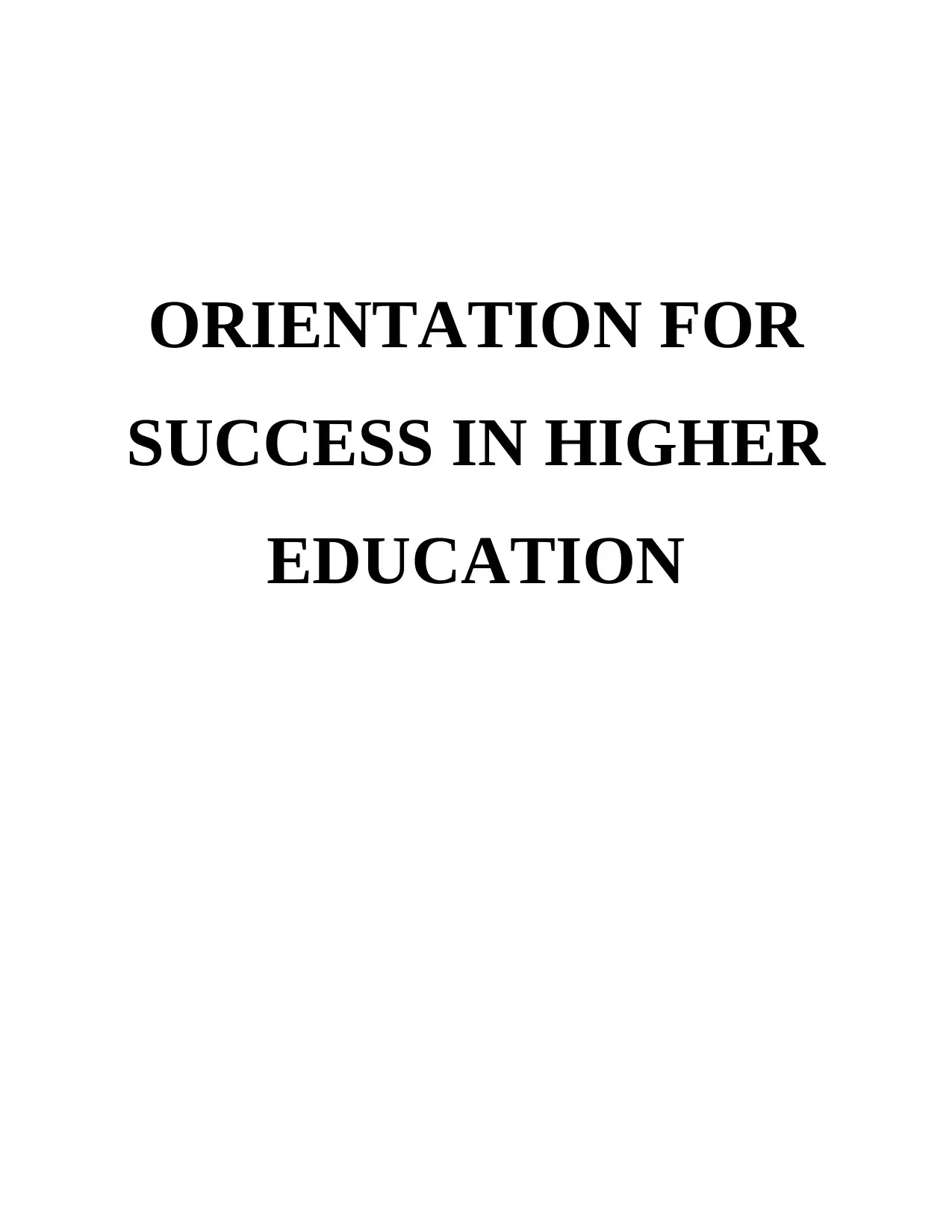
ORIENTATION FOR
SUCCESS IN HIGHER
EDUCATION
SUCCESS IN HIGHER
EDUCATION
Paraphrase This Document
Need a fresh take? Get an instant paraphrase of this document with our AI Paraphraser
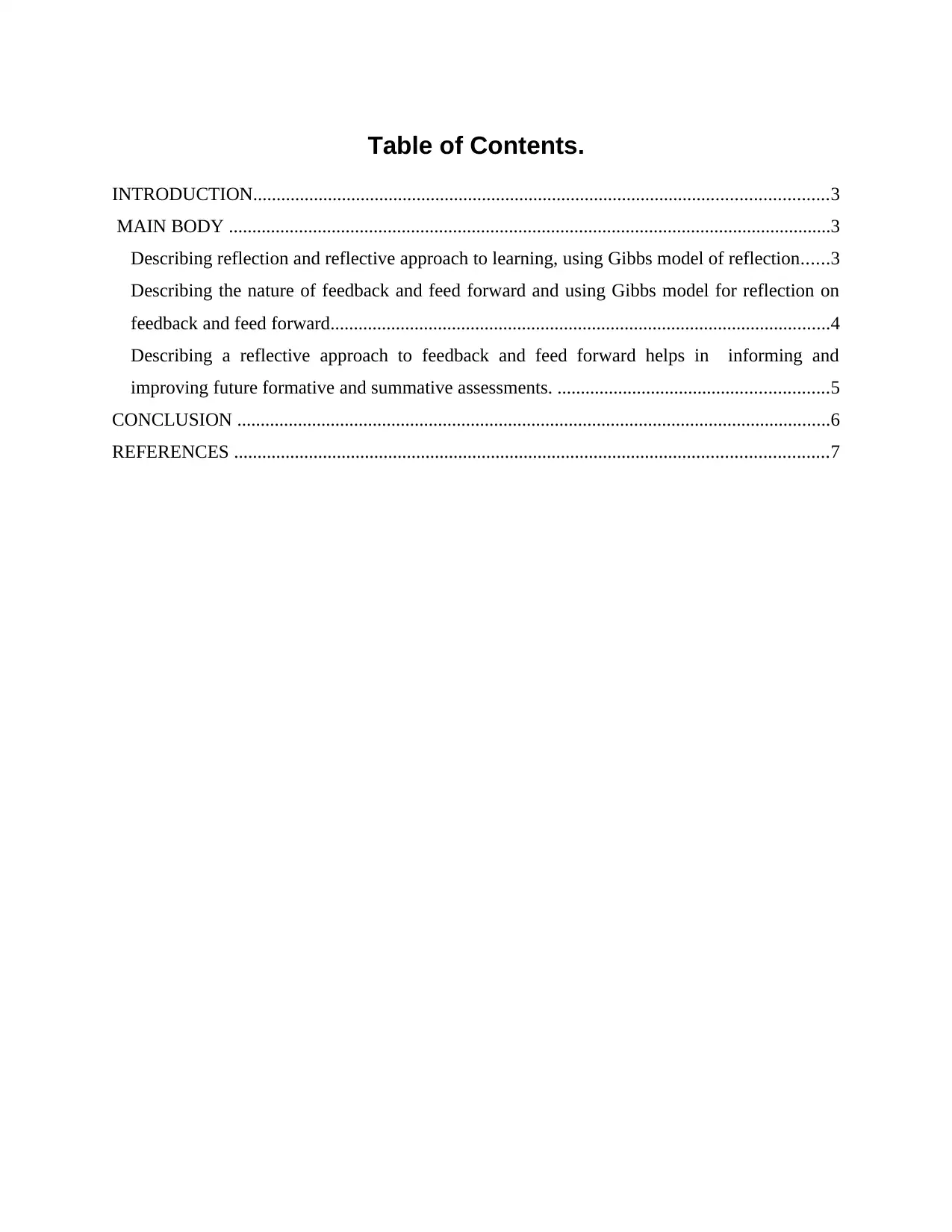
Table of Contents.
INTRODUCTION...........................................................................................................................3
MAIN BODY .................................................................................................................................3
Describing reflection and reflective approach to learning, using Gibbs model of reflection......3
Describing the nature of feedback and feed forward and using Gibbs model for reflection on
feedback and feed forward...........................................................................................................4
Describing a reflective approach to feedback and feed forward helps in informing and
improving future formative and summative assessments. ..........................................................5
CONCLUSION ...............................................................................................................................6
REFERENCES ...............................................................................................................................7
INTRODUCTION...........................................................................................................................3
MAIN BODY .................................................................................................................................3
Describing reflection and reflective approach to learning, using Gibbs model of reflection......3
Describing the nature of feedback and feed forward and using Gibbs model for reflection on
feedback and feed forward...........................................................................................................4
Describing a reflective approach to feedback and feed forward helps in informing and
improving future formative and summative assessments. ..........................................................5
CONCLUSION ...............................................................................................................................6
REFERENCES ...............................................................................................................................7
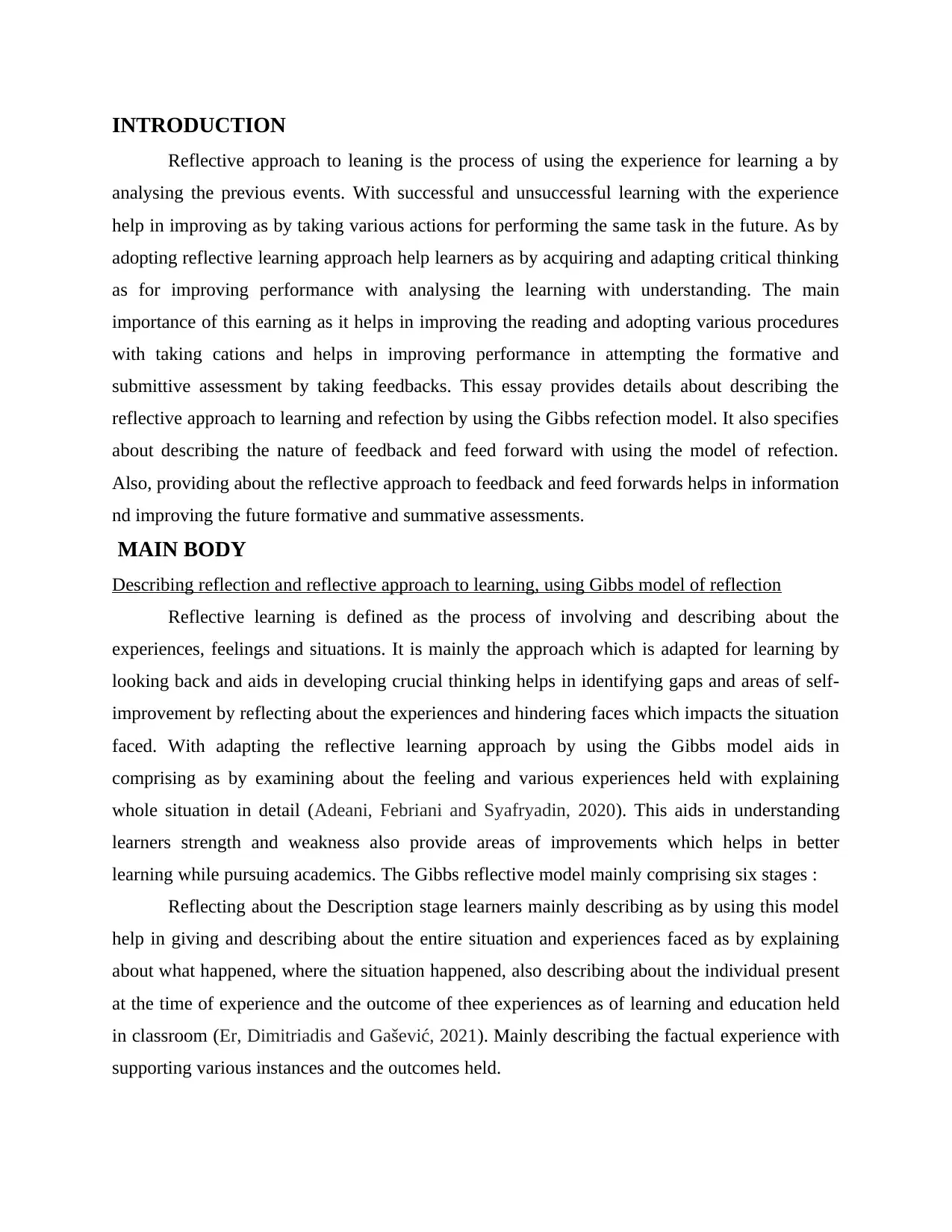
INTRODUCTION
Reflective approach to leaning is the process of using the experience for learning a by
analysing the previous events. With successful and unsuccessful learning with the experience
help in improving as by taking various actions for performing the same task in the future. As by
adopting reflective learning approach help learners as by acquiring and adapting critical thinking
as for improving performance with analysing the learning with understanding. The main
importance of this earning as it helps in improving the reading and adopting various procedures
with taking cations and helps in improving performance in attempting the formative and
submittive assessment by taking feedbacks. This essay provides details about describing the
reflective approach to learning and refection by using the Gibbs refection model. It also specifies
about describing the nature of feedback and feed forward with using the model of refection.
Also, providing about the reflective approach to feedback and feed forwards helps in information
nd improving the future formative and summative assessments.
MAIN BODY
Describing reflection and reflective approach to learning, using Gibbs model of reflection
Reflective learning is defined as the process of involving and describing about the
experiences, feelings and situations. It is mainly the approach which is adapted for learning by
looking back and aids in developing crucial thinking helps in identifying gaps and areas of self-
improvement by reflecting about the experiences and hindering faces which impacts the situation
faced. With adapting the reflective learning approach by using the Gibbs model aids in
comprising as by examining about the feeling and various experiences held with explaining
whole situation in detail (Adeani, Febriani and Syafryadin, 2020). This aids in understanding
learners strength and weakness also provide areas of improvements which helps in better
learning while pursuing academics. The Gibbs reflective model mainly comprising six stages :
Reflecting about the Description stage learners mainly describing as by using this model
help in giving and describing about the entire situation and experiences faced as by explaining
about what happened, where the situation happened, also describing about the individual present
at the time of experience and the outcome of thee experiences as of learning and education held
in classroom (Er, Dimitriadis and Gašević, 2021). Mainly describing the factual experience with
supporting various instances and the outcomes held.
Reflective approach to leaning is the process of using the experience for learning a by
analysing the previous events. With successful and unsuccessful learning with the experience
help in improving as by taking various actions for performing the same task in the future. As by
adopting reflective learning approach help learners as by acquiring and adapting critical thinking
as for improving performance with analysing the learning with understanding. The main
importance of this earning as it helps in improving the reading and adopting various procedures
with taking cations and helps in improving performance in attempting the formative and
submittive assessment by taking feedbacks. This essay provides details about describing the
reflective approach to learning and refection by using the Gibbs refection model. It also specifies
about describing the nature of feedback and feed forward with using the model of refection.
Also, providing about the reflective approach to feedback and feed forwards helps in information
nd improving the future formative and summative assessments.
MAIN BODY
Describing reflection and reflective approach to learning, using Gibbs model of reflection
Reflective learning is defined as the process of involving and describing about the
experiences, feelings and situations. It is mainly the approach which is adapted for learning by
looking back and aids in developing crucial thinking helps in identifying gaps and areas of self-
improvement by reflecting about the experiences and hindering faces which impacts the situation
faced. With adapting the reflective learning approach by using the Gibbs model aids in
comprising as by examining about the feeling and various experiences held with explaining
whole situation in detail (Adeani, Febriani and Syafryadin, 2020). This aids in understanding
learners strength and weakness also provide areas of improvements which helps in better
learning while pursuing academics. The Gibbs reflective model mainly comprising six stages :
Reflecting about the Description stage learners mainly describing as by using this model
help in giving and describing about the entire situation and experiences faced as by explaining
about what happened, where the situation happened, also describing about the individual present
at the time of experience and the outcome of thee experiences as of learning and education held
in classroom (Er, Dimitriadis and Gašević, 2021). Mainly describing the factual experience with
supporting various instances and the outcomes held.
⊘ This is a preview!⊘
Do you want full access?
Subscribe today to unlock all pages.

Trusted by 1+ million students worldwide
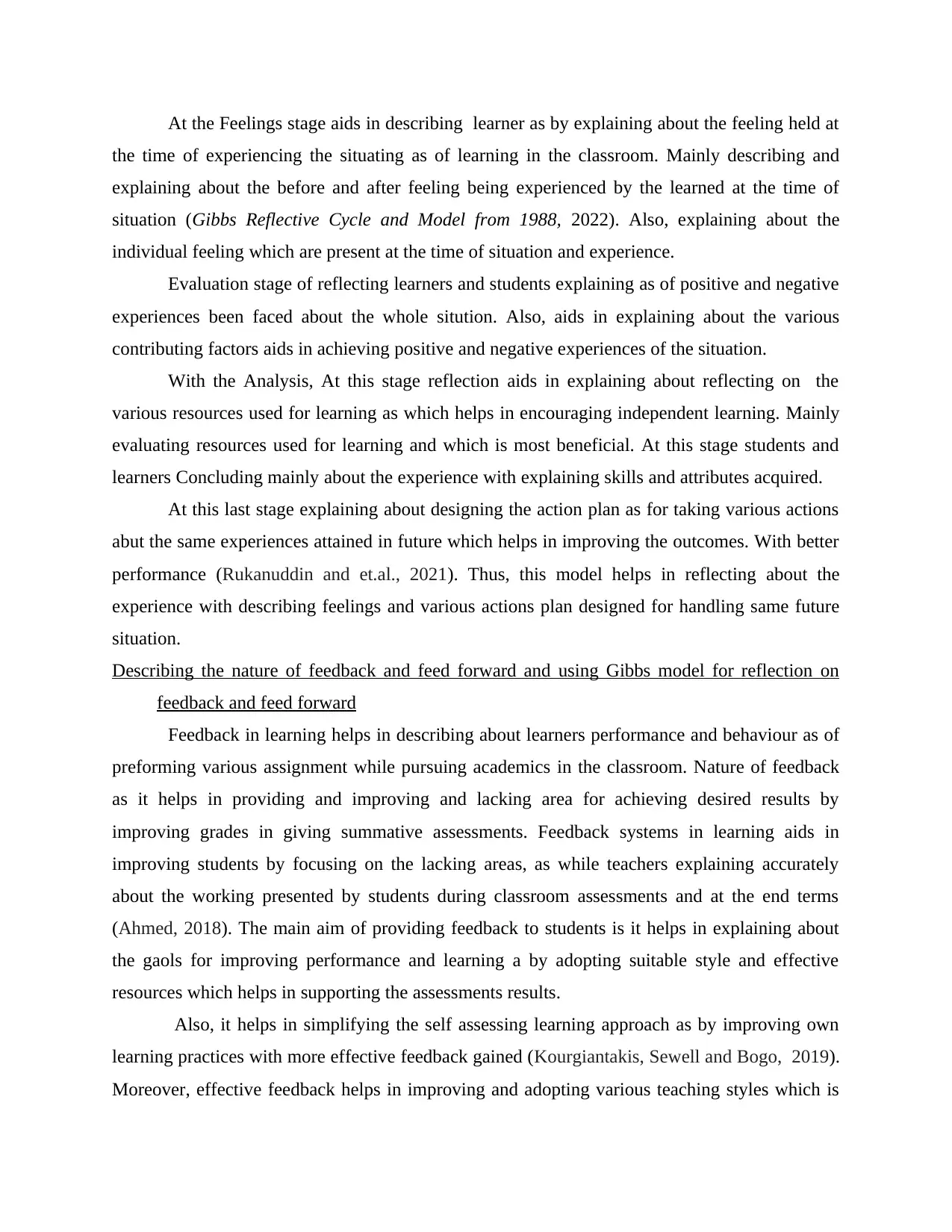
At the Feelings stage aids in describing learner as by explaining about the feeling held at
the time of experiencing the situating as of learning in the classroom. Mainly describing and
explaining about the before and after feeling being experienced by the learned at the time of
situation (Gibbs Reflective Cycle and Model from 1988, 2022). Also, explaining about the
individual feeling which are present at the time of situation and experience.
Evaluation stage of reflecting learners and students explaining as of positive and negative
experiences been faced about the whole sitution. Also, aids in explaining about the various
contributing factors aids in achieving positive and negative experiences of the situation.
With the Analysis, At this stage reflection aids in explaining about reflecting on the
various resources used for learning as which helps in encouraging independent learning. Mainly
evaluating resources used for learning and which is most beneficial. At this stage students and
learners Concluding mainly about the experience with explaining skills and attributes acquired.
At this last stage explaining about designing the action plan as for taking various actions
abut the same experiences attained in future which helps in improving the outcomes. With better
performance (Rukanuddin and et.al., 2021). Thus, this model helps in reflecting about the
experience with describing feelings and various actions plan designed for handling same future
situation.
Describing the nature of feedback and feed forward and using Gibbs model for reflection on
feedback and feed forward
Feedback in learning helps in describing about learners performance and behaviour as of
preforming various assignment while pursuing academics in the classroom. Nature of feedback
as it helps in providing and improving and lacking area for achieving desired results by
improving grades in giving summative assessments. Feedback systems in learning aids in
improving students by focusing on the lacking areas, as while teachers explaining accurately
about the working presented by students during classroom assessments and at the end terms
(Ahmed, 2018). The main aim of providing feedback to students is it helps in explaining about
the gaols for improving performance and learning a by adopting suitable style and effective
resources which helps in supporting the assessments results.
Also, it helps in simplifying the self assessing learning approach as by improving own
learning practices with more effective feedback gained (Kourgiantakis, Sewell and Bogo, 2019).
Moreover, effective feedback helps in improving and adopting various teaching styles which is
the time of experiencing the situating as of learning in the classroom. Mainly describing and
explaining about the before and after feeling being experienced by the learned at the time of
situation (Gibbs Reflective Cycle and Model from 1988, 2022). Also, explaining about the
individual feeling which are present at the time of situation and experience.
Evaluation stage of reflecting learners and students explaining as of positive and negative
experiences been faced about the whole sitution. Also, aids in explaining about the various
contributing factors aids in achieving positive and negative experiences of the situation.
With the Analysis, At this stage reflection aids in explaining about reflecting on the
various resources used for learning as which helps in encouraging independent learning. Mainly
evaluating resources used for learning and which is most beneficial. At this stage students and
learners Concluding mainly about the experience with explaining skills and attributes acquired.
At this last stage explaining about designing the action plan as for taking various actions
abut the same experiences attained in future which helps in improving the outcomes. With better
performance (Rukanuddin and et.al., 2021). Thus, this model helps in reflecting about the
experience with describing feelings and various actions plan designed for handling same future
situation.
Describing the nature of feedback and feed forward and using Gibbs model for reflection on
feedback and feed forward
Feedback in learning helps in describing about learners performance and behaviour as of
preforming various assignment while pursuing academics in the classroom. Nature of feedback
as it helps in providing and improving and lacking area for achieving desired results by
improving grades in giving summative assessments. Feedback systems in learning aids in
improving students by focusing on the lacking areas, as while teachers explaining accurately
about the working presented by students during classroom assessments and at the end terms
(Ahmed, 2018). The main aim of providing feedback to students is it helps in explaining about
the gaols for improving performance and learning a by adopting suitable style and effective
resources which helps in supporting the assessments results.
Also, it helps in simplifying the self assessing learning approach as by improving own
learning practices with more effective feedback gained (Kourgiantakis, Sewell and Bogo, 2019).
Moreover, effective feedback helps in improving and adopting various teaching styles which is
Paraphrase This Document
Need a fresh take? Get an instant paraphrase of this document with our AI Paraphraser
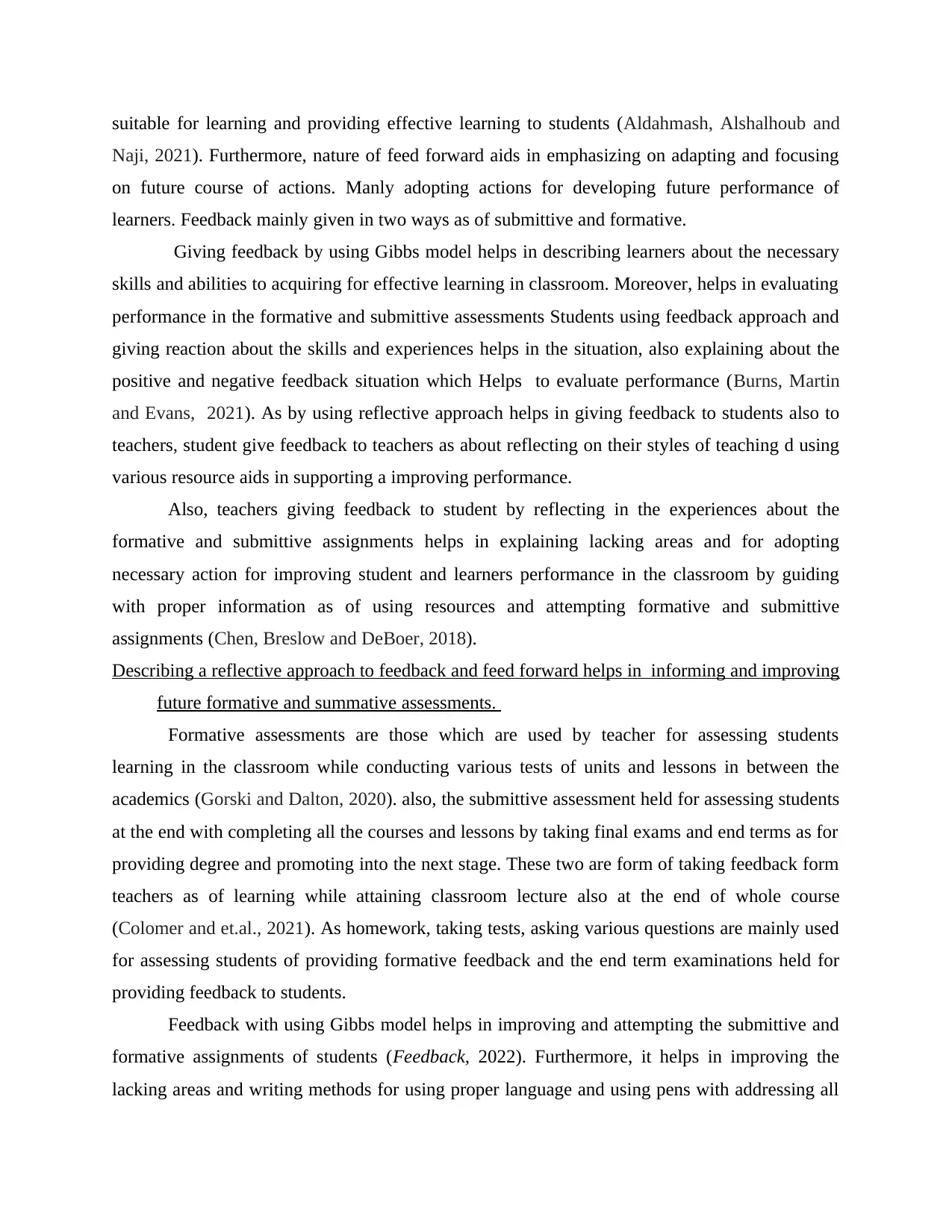
suitable for learning and providing effective learning to students (Aldahmash, Alshalhoub and
Naji, 2021). Furthermore, nature of feed forward aids in emphasizing on adapting and focusing
on future course of actions. Manly adopting actions for developing future performance of
learners. Feedback mainly given in two ways as of submittive and formative.
Giving feedback by using Gibbs model helps in describing learners about the necessary
skills and abilities to acquiring for effective learning in classroom. Moreover, helps in evaluating
performance in the formative and submittive assessments Students using feedback approach and
giving reaction about the skills and experiences helps in the situation, also explaining about the
positive and negative feedback situation which Helps to evaluate performance (Burns, Martin
and Evans, 2021). As by using reflective approach helps in giving feedback to students also to
teachers, student give feedback to teachers as about reflecting on their styles of teaching d using
various resource aids in supporting a improving performance.
Also, teachers giving feedback to student by reflecting in the experiences about the
formative and submittive assignments helps in explaining lacking areas and for adopting
necessary action for improving student and learners performance in the classroom by guiding
with proper information as of using resources and attempting formative and submittive
assignments (Chen, Breslow and DeBoer, 2018).
Describing a reflective approach to feedback and feed forward helps in informing and improving
future formative and summative assessments.
Formative assessments are those which are used by teacher for assessing students
learning in the classroom while conducting various tests of units and lessons in between the
academics (Gorski and Dalton, 2020). also, the submittive assessment held for assessing students
at the end with completing all the courses and lessons by taking final exams and end terms as for
providing degree and promoting into the next stage. These two are form of taking feedback form
teachers as of learning while attaining classroom lecture also at the end of whole course
(Colomer and et.al., 2021). As homework, taking tests, asking various questions are mainly used
for assessing students of providing formative feedback and the end term examinations held for
providing feedback to students.
Feedback with using Gibbs model helps in improving and attempting the submittive and
formative assignments of students (Feedback, 2022). Furthermore, it helps in improving the
lacking areas and writing methods for using proper language and using pens with addressing all
Naji, 2021). Furthermore, nature of feed forward aids in emphasizing on adapting and focusing
on future course of actions. Manly adopting actions for developing future performance of
learners. Feedback mainly given in two ways as of submittive and formative.
Giving feedback by using Gibbs model helps in describing learners about the necessary
skills and abilities to acquiring for effective learning in classroom. Moreover, helps in evaluating
performance in the formative and submittive assessments Students using feedback approach and
giving reaction about the skills and experiences helps in the situation, also explaining about the
positive and negative feedback situation which Helps to evaluate performance (Burns, Martin
and Evans, 2021). As by using reflective approach helps in giving feedback to students also to
teachers, student give feedback to teachers as about reflecting on their styles of teaching d using
various resource aids in supporting a improving performance.
Also, teachers giving feedback to student by reflecting in the experiences about the
formative and submittive assignments helps in explaining lacking areas and for adopting
necessary action for improving student and learners performance in the classroom by guiding
with proper information as of using resources and attempting formative and submittive
assignments (Chen, Breslow and DeBoer, 2018).
Describing a reflective approach to feedback and feed forward helps in informing and improving
future formative and summative assessments.
Formative assessments are those which are used by teacher for assessing students
learning in the classroom while conducting various tests of units and lessons in between the
academics (Gorski and Dalton, 2020). also, the submittive assessment held for assessing students
at the end with completing all the courses and lessons by taking final exams and end terms as for
providing degree and promoting into the next stage. These two are form of taking feedback form
teachers as of learning while attaining classroom lecture also at the end of whole course
(Colomer and et.al., 2021). As homework, taking tests, asking various questions are mainly used
for assessing students of providing formative feedback and the end term examinations held for
providing feedback to students.
Feedback with using Gibbs model helps in improving and attempting the submittive and
formative assignments of students (Feedback, 2022). Furthermore, it helps in improving the
lacking areas and writing methods for using proper language and using pens with addressing all
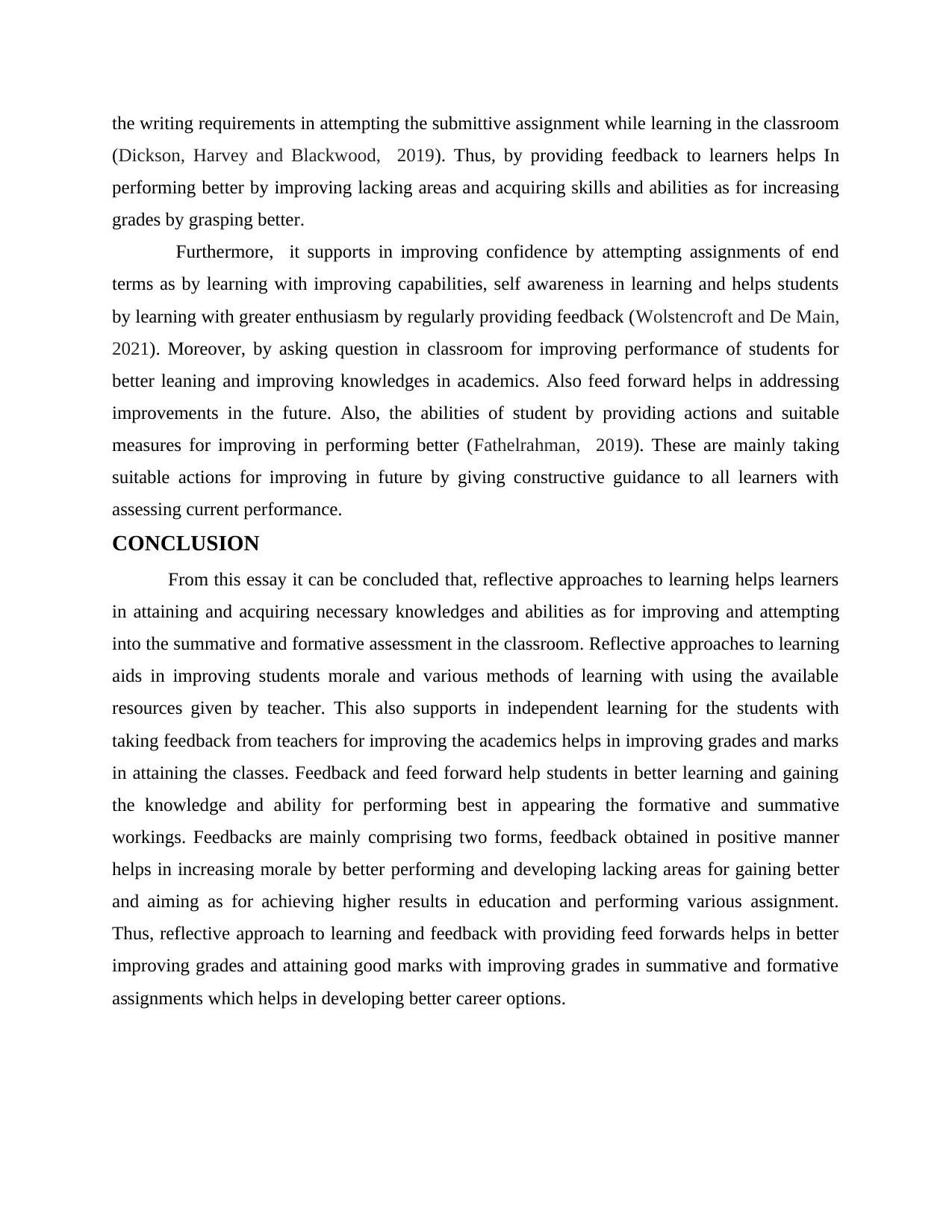
the writing requirements in attempting the submittive assignment while learning in the classroom
(Dickson, Harvey and Blackwood, 2019). Thus, by providing feedback to learners helps In
performing better by improving lacking areas and acquiring skills and abilities as for increasing
grades by grasping better.
Furthermore, it supports in improving confidence by attempting assignments of end
terms as by learning with improving capabilities, self awareness in learning and helps students
by learning with greater enthusiasm by regularly providing feedback (Wolstencroft and De Main,
2021). Moreover, by asking question in classroom for improving performance of students for
better leaning and improving knowledges in academics. Also feed forward helps in addressing
improvements in the future. Also, the abilities of student by providing actions and suitable
measures for improving in performing better (Fathelrahman, 2019). These are mainly taking
suitable actions for improving in future by giving constructive guidance to all learners with
assessing current performance.
CONCLUSION
From this essay it can be concluded that, reflective approaches to learning helps learners
in attaining and acquiring necessary knowledges and abilities as for improving and attempting
into the summative and formative assessment in the classroom. Reflective approaches to learning
aids in improving students morale and various methods of learning with using the available
resources given by teacher. This also supports in independent learning for the students with
taking feedback from teachers for improving the academics helps in improving grades and marks
in attaining the classes. Feedback and feed forward help students in better learning and gaining
the knowledge and ability for performing best in appearing the formative and summative
workings. Feedbacks are mainly comprising two forms, feedback obtained in positive manner
helps in increasing morale by better performing and developing lacking areas for gaining better
and aiming as for achieving higher results in education and performing various assignment.
Thus, reflective approach to learning and feedback with providing feed forwards helps in better
improving grades and attaining good marks with improving grades in summative and formative
assignments which helps in developing better career options.
(Dickson, Harvey and Blackwood, 2019). Thus, by providing feedback to learners helps In
performing better by improving lacking areas and acquiring skills and abilities as for increasing
grades by grasping better.
Furthermore, it supports in improving confidence by attempting assignments of end
terms as by learning with improving capabilities, self awareness in learning and helps students
by learning with greater enthusiasm by regularly providing feedback (Wolstencroft and De Main,
2021). Moreover, by asking question in classroom for improving performance of students for
better leaning and improving knowledges in academics. Also feed forward helps in addressing
improvements in the future. Also, the abilities of student by providing actions and suitable
measures for improving in performing better (Fathelrahman, 2019). These are mainly taking
suitable actions for improving in future by giving constructive guidance to all learners with
assessing current performance.
CONCLUSION
From this essay it can be concluded that, reflective approaches to learning helps learners
in attaining and acquiring necessary knowledges and abilities as for improving and attempting
into the summative and formative assessment in the classroom. Reflective approaches to learning
aids in improving students morale and various methods of learning with using the available
resources given by teacher. This also supports in independent learning for the students with
taking feedback from teachers for improving the academics helps in improving grades and marks
in attaining the classes. Feedback and feed forward help students in better learning and gaining
the knowledge and ability for performing best in appearing the formative and summative
workings. Feedbacks are mainly comprising two forms, feedback obtained in positive manner
helps in increasing morale by better performing and developing lacking areas for gaining better
and aiming as for achieving higher results in education and performing various assignment.
Thus, reflective approach to learning and feedback with providing feed forwards helps in better
improving grades and attaining good marks with improving grades in summative and formative
assignments which helps in developing better career options.
⊘ This is a preview!⊘
Do you want full access?
Subscribe today to unlock all pages.

Trusted by 1+ million students worldwide
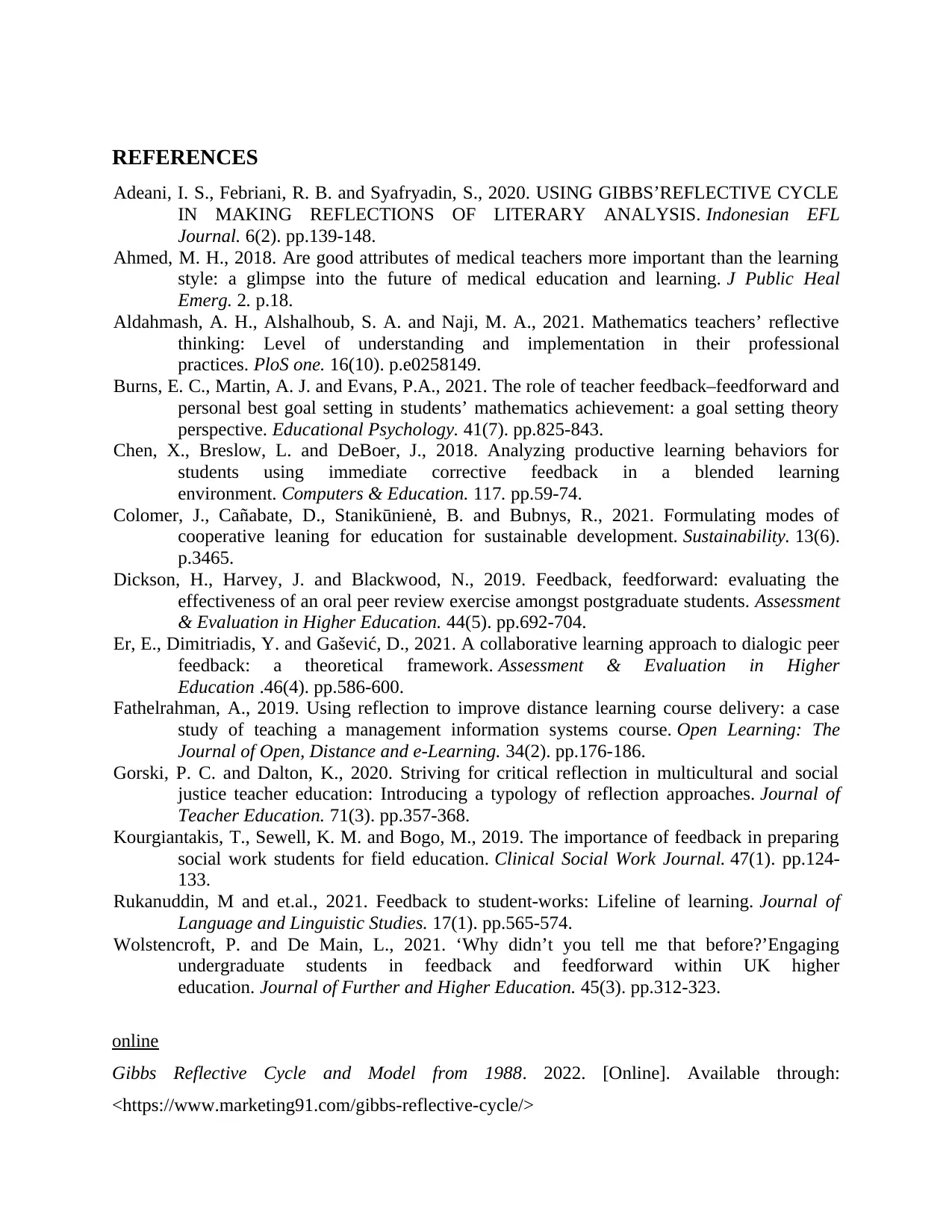
REFERENCES
Adeani, I. S., Febriani, R. B. and Syafryadin, S., 2020. USING GIBBS’REFLECTIVE CYCLE
IN MAKING REFLECTIONS OF LITERARY ANALYSIS. Indonesian EFL
Journal. 6(2). pp.139-148.
Ahmed, M. H., 2018. Are good attributes of medical teachers more important than the learning
style: a glimpse into the future of medical education and learning. J Public Heal
Emerg. 2. p.18.
Aldahmash, A. H., Alshalhoub, S. A. and Naji, M. A., 2021. Mathematics teachers’ reflective
thinking: Level of understanding and implementation in their professional
practices. PloS one. 16(10). p.e0258149.
Burns, E. C., Martin, A. J. and Evans, P.A., 2021. The role of teacher feedback–feedforward and
personal best goal setting in students’ mathematics achievement: a goal setting theory
perspective. Educational Psychology. 41(7). pp.825-843.
Chen, X., Breslow, L. and DeBoer, J., 2018. Analyzing productive learning behaviors for
students using immediate corrective feedback in a blended learning
environment. Computers & Education. 117. pp.59-74.
Colomer, J., Cañabate, D., Stanikūnienė, B. and Bubnys, R., 2021. Formulating modes of
cooperative leaning for education for sustainable development. Sustainability. 13(6).
p.3465.
Dickson, H., Harvey, J. and Blackwood, N., 2019. Feedback, feedforward: evaluating the
effectiveness of an oral peer review exercise amongst postgraduate students. Assessment
& Evaluation in Higher Education. 44(5). pp.692-704.
Er, E., Dimitriadis, Y. and Gašević, D., 2021. A collaborative learning approach to dialogic peer
feedback: a theoretical framework. Assessment & Evaluation in Higher
Education .46(4). pp.586-600.
Fathelrahman, A., 2019. Using reflection to improve distance learning course delivery: a case
study of teaching a management information systems course. Open Learning: The
Journal of Open, Distance and e-Learning. 34(2). pp.176-186.
Gorski, P. C. and Dalton, K., 2020. Striving for critical reflection in multicultural and social
justice teacher education: Introducing a typology of reflection approaches. Journal of
Teacher Education. 71(3). pp.357-368.
Kourgiantakis, T., Sewell, K. M. and Bogo, M., 2019. The importance of feedback in preparing
social work students for field education. Clinical Social Work Journal. 47(1). pp.124-
133.
Rukanuddin, M and et.al., 2021. Feedback to student-works: Lifeline of learning. Journal of
Language and Linguistic Studies. 17(1). pp.565-574.
Wolstencroft, P. and De Main, L., 2021. ‘Why didn’t you tell me that before?’Engaging
undergraduate students in feedback and feedforward within UK higher
education. Journal of Further and Higher Education. 45(3). pp.312-323.
online
Gibbs Reflective Cycle and Model from 1988. 2022. [Online]. Available through:
<https://www.marketing91.com/gibbs-reflective-cycle/>
Adeani, I. S., Febriani, R. B. and Syafryadin, S., 2020. USING GIBBS’REFLECTIVE CYCLE
IN MAKING REFLECTIONS OF LITERARY ANALYSIS. Indonesian EFL
Journal. 6(2). pp.139-148.
Ahmed, M. H., 2018. Are good attributes of medical teachers more important than the learning
style: a glimpse into the future of medical education and learning. J Public Heal
Emerg. 2. p.18.
Aldahmash, A. H., Alshalhoub, S. A. and Naji, M. A., 2021. Mathematics teachers’ reflective
thinking: Level of understanding and implementation in their professional
practices. PloS one. 16(10). p.e0258149.
Burns, E. C., Martin, A. J. and Evans, P.A., 2021. The role of teacher feedback–feedforward and
personal best goal setting in students’ mathematics achievement: a goal setting theory
perspective. Educational Psychology. 41(7). pp.825-843.
Chen, X., Breslow, L. and DeBoer, J., 2018. Analyzing productive learning behaviors for
students using immediate corrective feedback in a blended learning
environment. Computers & Education. 117. pp.59-74.
Colomer, J., Cañabate, D., Stanikūnienė, B. and Bubnys, R., 2021. Formulating modes of
cooperative leaning for education for sustainable development. Sustainability. 13(6).
p.3465.
Dickson, H., Harvey, J. and Blackwood, N., 2019. Feedback, feedforward: evaluating the
effectiveness of an oral peer review exercise amongst postgraduate students. Assessment
& Evaluation in Higher Education. 44(5). pp.692-704.
Er, E., Dimitriadis, Y. and Gašević, D., 2021. A collaborative learning approach to dialogic peer
feedback: a theoretical framework. Assessment & Evaluation in Higher
Education .46(4). pp.586-600.
Fathelrahman, A., 2019. Using reflection to improve distance learning course delivery: a case
study of teaching a management information systems course. Open Learning: The
Journal of Open, Distance and e-Learning. 34(2). pp.176-186.
Gorski, P. C. and Dalton, K., 2020. Striving for critical reflection in multicultural and social
justice teacher education: Introducing a typology of reflection approaches. Journal of
Teacher Education. 71(3). pp.357-368.
Kourgiantakis, T., Sewell, K. M. and Bogo, M., 2019. The importance of feedback in preparing
social work students for field education. Clinical Social Work Journal. 47(1). pp.124-
133.
Rukanuddin, M and et.al., 2021. Feedback to student-works: Lifeline of learning. Journal of
Language and Linguistic Studies. 17(1). pp.565-574.
Wolstencroft, P. and De Main, L., 2021. ‘Why didn’t you tell me that before?’Engaging
undergraduate students in feedback and feedforward within UK higher
education. Journal of Further and Higher Education. 45(3). pp.312-323.
online
Gibbs Reflective Cycle and Model from 1988. 2022. [Online]. Available through:
<https://www.marketing91.com/gibbs-reflective-cycle/>
Paraphrase This Document
Need a fresh take? Get an instant paraphrase of this document with our AI Paraphraser
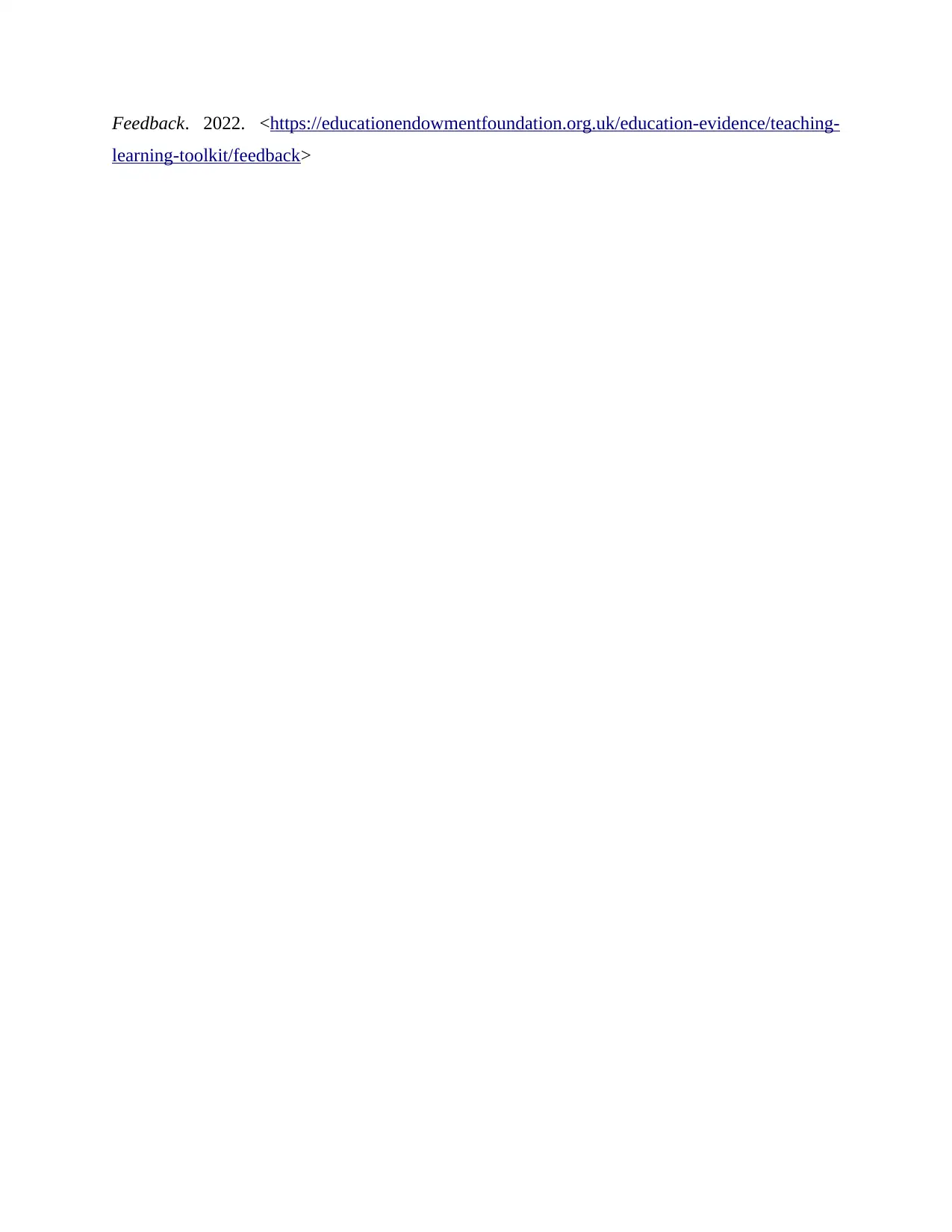
Feedback. 2022. <https://educationendowmentfoundation.org.uk/education-evidence/teaching-
learning-toolkit/feedback>
learning-toolkit/feedback>
1 out of 8
Related Documents
Your All-in-One AI-Powered Toolkit for Academic Success.
+13062052269
info@desklib.com
Available 24*7 on WhatsApp / Email
![[object Object]](/_next/static/media/star-bottom.7253800d.svg)
Unlock your academic potential
Copyright © 2020–2026 A2Z Services. All Rights Reserved. Developed and managed by ZUCOL.





